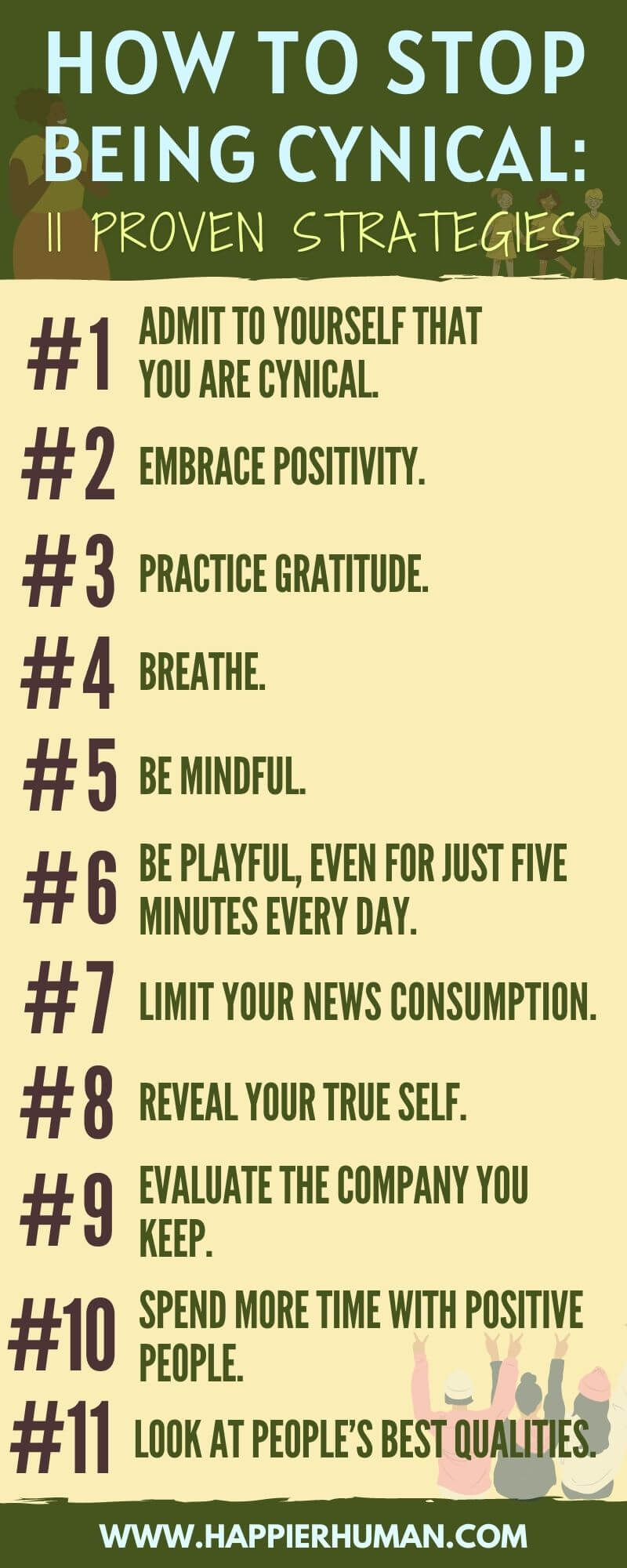There might be affiliate links on this page, which means we get a small commission of anything you buy. As an Amazon Associate we earn from qualifying purchases. Please do your own research before making any online purchase.
Are you a cynic? If so, do you feel this behavior is limiting your personal development?
You might describe yourself as someone who likes to keep it real—someone who often gives sarcastic responses to most questions and conversation topics. Unfortunately, always acting cynical can have a long-term negative impact on your happiness.
If you’d like to learn how to curb this personality trait, here are 11 proven strategies you can use to stop being cynical.
How Cynicism Hurts People — Including You
You probably think that being cynical keeps you from getting hurt by other people and situations when they disappoint you by not living up to your expectations.
But cynicism is toxic. It robs you of happiness. You’re obsessed with the idea that the world is set to disappoint you, so you might as well turn your back to it first.
A cynical attitude hurts you in ways you’d probably never expect. On the whole, it affects your health, career, earnings, and relationships. Let's look at some of the ways that being cynical can be detrimental to your well-being.
People who are more cynical make significantly less money.
As a cynic, not trusting others, being less confident in your abilities, and calling in sick often are behaviors that prevent you from advancing in most careers. Cynics may also have personality traits in common, such as neuroticism and introversion, as well as less education than those who have a brighter view of the world.
In our society, where people have a lot of options to get help from other people that can greatly benefit them in the long run, being a cynic is very limiting. Cynical people put themselves at a disadvantage by not pursuing valuable opportunities such as asking for help, working with other people, and making compromises.
Cynical people do not like to rely on other people because they often suspect others have mean motives. Not asking for help when in need can quickly undermine a cynic's economic success. Cynicism and low income can act as a cycle, as cynics earn less money, which increases their cynicism, which then makes them avoid practicing positive behaviors that could increase their income.
Being cynical prevents you from having meaningful relationships or being close to others.
If you constantly complain or are often sarcastic, people will avoid you. It is difficult to respond to cynical people without having negative thoughts or feelings yourself, so people often try to avoid cynics in order to maintain a positive mindset. It is a challenge to overpower the dark cloud of pessimism and maintain a positive spirit, so it seems best to just avoid those who have negative views.
Further, people who are cynical often choose to keep their distance from other people in general, which prevents them from developing meaningful relationships. If you think that everyone is always out to get you, you are much less likely to welcome someone into your life.
You are inevitably going to rub off on the people around you if you maintain a cynical attitude, but people generally do not want to live unhappy lives. If you are constantly putting down well-meaning people, those who are close to you will assume that you do the same when it comes to your them.
For example, if you tell a co-worker about the “secret agenda” that you think the cashier at the coffee place had this morning when he or she told you to “have a good day,” your co-worker will probably think you have those same negative feelings about them.
The video below shows some common habits that make people dislike you from the first meeting. Perhaps you can spot some habits that you or people you know use to keep others at arm’s length. Being aware of these tendencies can help you avoid doing them if you intend to stop being cynical.
Cynical people have a higher risk of strokes and heart ailments.
Being cynical can be both a cause and a consequence of poor physical health. It's not completely clear how cynicism affects the heart or the brain, but negative emotions are known to have many impacts on your metabolic, hormonal, and immune systems.
People who suffer from high levels of stress, symptoms of depression, or feelings of hostility may experience changes in their bodies (such as inflammation) that increase their risk for experiencing a stroke or cardiovascular disease. Cynicism and poor health often work in a cycle, with each factor worsening the other.
Also, people who have high levels of cynicism are more likely to have unhealthy habits such as smoking and drinking, which increase their risk of these diseases as well. They may also be less likely to take care of their bodies through regular exercise and proper nutrition.
Cynics are more likely to have dementia.
Cynics are three times more likely to develop dementia than people who maintain faith in humanity. Constantly thinking that people are motivated only by their own wants and needs, or that people lie to get what they want, increases one's risk of cognitive decline down the line, which adds to the idea that people’s outlook on life and their personalities can impact physical health.
Although researchers are not yet sure what causes the link between cynicism and dementia, it could be due to an elevated amount of stress hormones that are known to increase one's risk of developing dementia.
Cynics are more prone to depression.
While being cynical doesn’t necessarily cause depression, it may be a risk factor, and possibly lead to more depressive reactions to stress. Cynicism comes from a disconnect between expectation or hopes and reality, which leads to feelings of helplessness and can prompt one's sense that nothing they do in life truly matters.
The connection between cynicism and depression works both ways. In some cases, a cynical person may find that their mindset spirals out of control and their negative views of the world lead to the development of depression.
Cynicism is part of a defensive stance people take to protect themselves from getting hurt. It's usually triggered by an experience of hurt or anger where a person allows these feelings to fester rather than dealing with them directly. When people become cynical of one thing, it can slowly turn their attitude against everything.
In other cases, someone who has already been diagnosed with depression may find their mental health condition leads to a cynical mindset. One study found that people who have cynical personalities are five times more likely to develop depression than those who do not have this personality trait. One thought process that people who are cynical and people who suffer from depression share is constantly thinking that anyone who is being nice to them has ulterior selfish motives.
Now that you know how being cynical can have a negative impact on your life and overall well-being, let's look at some concrete things you can do to stop this negative mindset.
11 Tips to Stop Being Cynical
1. Admit to yourself that you are cynical.
Once you acknowledge this, it will be easier to work on changing your attitude. Once you accept the problem, when you catch yourself being negative, you can acknowledge your pessimistic attitude and then let it pass.
Negativity may be so natural and embedded in your life that you have forgotten that it doesn't have to be your default frame of mind. Once you begin to notice your thoughts, you will find that you have more control over your attitude than you think you do.
As with other things in life, admitting the problem to yourself is the first step to fixing it. To override your negative thought process, reflect upon your way of thinking and admit you're being cynical. Then, whenever you catch yourself being negative, stop to really think about it. Doing so may help you realize how unhelpful or unproductive your thoughts are.
2. Embrace positivity.
You can “fake it until you make it.” Try to be a little more enthusiastic about other people and situations, whether those feelings are genuine or fake. Try to be interested in what other people have to offer or say. Doing so will help you realize that everyone you meet knows something that you don't know and can benefit you in some way, even if it is small.
The unfortunate thing about negative thoughts is that they have a stronger impact on your mind than positive thoughts. In fact, the negative impact of a setback in your work has three times the impact on your motivation than any positive progress that you make.
It's simply easier to ruminate on the bad things that have happened to you than the good. Become aware of the positive things happening around you instead. Whenever you find yourself having negative thoughts or comments, counter them with positive, uplifting ones.
Our brains are wired to pay more attention to negative things for the sake of self-protection. We are constantly looking for threats like people had to do when they had to hunt and gather for survival.
However, this vigilance for negative information often leads to a negative feedback loop that doesn't represent reality. A few things that you can do to rewire your brain for positivity include writing down positive thoughts, giving positive compliments to other people, and doing something nice for someone.
(Take our positivity quiz to discover your positivity ratio).
3. Practice gratitude.

Having an attitude of gratitude is one guaranteed way to blast cynicism out of your system. Practicing gratitude neutralizes cynicism and cultivates a positive attitude. When you take the time to reflect on the good things in your life, you can’t help but feel a little more peaceful, and these positive feelings will overflow and affect your thoughts and actions.
While it may feel satisfying for a short period of time to have others agree with a negative comment that you make, those angry thoughts ultimately do nothing to make anything better, and simply perpetuate negative feelings. It is better to purposefully practice and spread gratitude to help encourage other people and yourself.
Try writing down three to five things that you are grateful for every night before you go to bed. Despite the fact that this is extremely simple, this trick can significantly help you be more positive.
4. Breathe.
Cynical people often hold their breaths without evening noticing this automatic defensive response. Practice breathing techniques, such as yoga, to oxygenate you and relax your thoughts.
Simply going outside and taking several deep breaths will help relieve the tension that you may be holding in your body. Holding one's breath is a response to frustration. While cynics may only hold their breaths for a moment, these periods of time add up. Make sure to stop and breathe in order to reestablish your internal rhythm and calm down.
5. Be mindful.
Practicing mindfulness can help curb your cynical tendencies. Mindfulness draws on techniques that are aimed at being present while noticing and accepting your internal feelings and emotions. When you are able to fully live in the moment and notice your mind wandering without passing any judgment, and then are able to bring your mind back into the present, you will reduce your cynical thoughts.
For people whose everyday unhappiness starts to turn into anxiety or depression, having the ability to observe their thoughts from a calmer place can be quite reassuring. If creating this distance between oneself and thoughts of despair can help improve someone's outlook on life, begin to trust other people, and develop hope for the future, there is a great benefit of practicing mindfulness to stop being cynical.
While being mindful will not erase cynicism entirely, it will allow you to acknowledge this negative mindset, accept it, and let it pass.
6. Be playful, even for just five minutes every day.
Allow yourself to play, be curious, have fun, and lose track of time for those five minutes. This may involve enjoying art or listening to some of your favorite songs. Or, it could mean participating in sports or spending time with some of your favorite people. The more positive activities you can participate in, the less cynical you will feel.
Doing these positive things will counteract your negative feelings about the world. You have to try to create a balance that will help you tip your attitude into the opposite direction of where it is. The more positive things that you do in life that make you happy, the better you will be able to view the world.
7. Limit your news consumption.
Most news these days, whether on TV or social media, focuses on the negative. However, we still seem to find ourselves following the latest breaking headlines.
Set aside a block of time to check the news if it’s really important to you, but limit it to that particular time only.

While we still want to keep up with the important things going on in the world, there are a few things that you can do to minimize the negativity that the news brings into your home. First, limit your checking of the main news networks, as these stations often fuel news with fire to keep people watching.
Instead, keep yourself updated through several different avenues, such as Twitter, Reddit, and even your local paper. There are a lot of resources that can keep you informed without bringing hours of negativity into your life.
8. Reveal your true self.
Most cynical people became that way because someone’s action caused them pain, often when they were younger. They are afraid of getting hurt again. Ask yourself, what caused this fear of getting hurt? It might be a tough thing to admit, but cynicism is often fueled by fear. And what do you do when you're scared? You hide.
You have to break down this wall of fear. If you are positive that you want to change your way of thinking, then you need to know the root of its cause. Once you realize what it is, you can address it head-on.
Our childhood experiences have a great impact on our behavior as adults. If you grew up with an unhealthy attachment to your parents—perhaps you were left home alone when you were a young child, or your parents were not able to comfort you when you were upset—it can lead to your distrusting of other people as an adult.
If you can pinpoint this issue, talking to a professional about these feelings can help you work through them. People can recover from bad childhood experiences, and those who have lived through bad conditions can often flourish and succeed in good conditions.
The video below from The School of Life discusses the most likely reason why some people are cynical. It’s not usually a misanthropic outlook, but something that happens to these people.
9. Evaluate the company you keep.
The people you spend time with influence your outlook. Examine the groups you follow on social media and the co-workers and other people you hang out with. Do they tend to be negative or positive?
The company you keep, both in real life and online, has a great impact on your thoughts and actions. Logic will tell you that if you surround yourself with positive people, their positivity will rub off on you.
However, the opposite is also true. If you surround yourself with cynical people who always see the negative in things, you will forget to look for the silver lining when you face a challenge. It can be tough to understand the dynamics of your circle, but if you find that you are often negative, take notice of the people around you.
Ask yourself who brings you up and who drags you down. Try to find a way to shift your time to limit your exposure to negative people. Your social network is yours to create or diminish, so make certain that you surround yourself with the positive support you need to get the most out of your life.
10. Spend more time with positive people.
According to Jim Rohn, we are the average of the five people with whom we spend the most time. Choose to be surrounded by people who exude optimism and positivity while maintaining a realistic outlook.
Similar to evaluating the company that you keep, think about the people in your life that you admire or look up to in some way. If you can maximize your time with them, it will make you feel like a better person yourself.

Don't let one of those five important people be someone who is toxic. Make sure to spend your time only with those who are truly worth it. If you have some very positive people in your life who live far away, find photos of them and display them where you can see them on a regular basis.
Use only photos of people who uplift a very specific positive trait in you. The simple act of curating these uplifting photos helps banish cynicism, as it is nearly impossible to rage against the world when a picture of your very best friend pops up during a lull in your workday.
11. Look at people’s best qualities.
Instead of focusing on other people’s weaknesses, search for their strengths or best qualities and focus on those instead. Focusing on the positive traits of other people will speed up your return to idealism by leaving no room for negative thoughts or feelings. It will help you generate a positive feedback loop mechanism that will make this habit become second nature.
Remember these things: kids laugh every day, people fall in love every day, and people reach great heights of success every day. Strangers help strangers, injustices are mitigated, art is created, and positive things are constantly happening.
Knowing that great things like these are happening all the time in our damaged society, you can also realize that each person you come across also has great qualities that can overshadow anything that may be negative about them.
Final Thoughts on How to Stop Being Cynical
Negative things happen beyond our control, and being cynical has perhaps been your way of protecting yourself and gaining a semblance of control in life.
However, if cynicism is affecting your health, relationships, and career, and is a major cause of unhappiness, then the only option is to change your attitude.
Finally, one proven way to improve your happiness and life satisfaction is to focus on goals that truly matter. To get started, check out this FREE printable worksheet and a step-by-step process that will help you set effective SMART goals.
The strategies featured in this article will be your guide on how to stop being cynical. It’s up to you to make the choice. And if you want to learn more about developing a more positive mindset, then read this article about how being more optimistic can make you a happier person.


